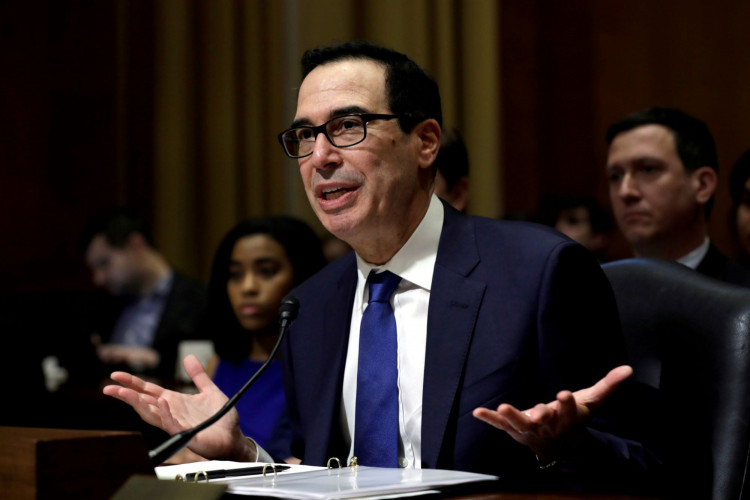The United States is taking unprecedented steps to contain the unprecedented COVID-19 crisis that will plunge its economy into a recession this year. It will implement a fiscal stimulus package in excess of $1 trillion to revive its wounded economy, including direct cash payments to Americans, in a bid to spur consumer spending.
Treasury Secretary Steve Mnuchin on Tuesday said the federal government is considering directly sending checks to Americans over the next two weeks. Each check will be worth $1,000 and will be sent to families.
"Americans need cash now," he said. "I mean now in the next two weeks."
Mnuchin also said individuals will be able to defer up to $1 million in tax payments to the IRS for 90 days due to the coronavirus outbreak. He said the $1 million thresholds were chosen to take into account pass-through businesses that pay taxes through the individual code on their owners' returns. He said corporations will be able to defer up to $10 million in tax payments. The deferrals would occur on an interest-free and penalty-free basis, said Mnuchin.
Sen. Mitt Romney (R-UT) was among the first to champion this direct cash assistance to Americans. On Monday, Romney again argued for his proposal to give $1,000 to American families to ease the growing financial pain caused by the coronavirus.
Funding for this massive spend will be derived from a huge stimulus, or spending, package estimated to be worth $850 billion at minimum and more than $1 trillion at maximum. The severity of the situation facing the U.S. economy because of COVID-19 can be gleaned from the fact the widely criticized federal bailout for the banking industry during the Great Recession of 2008 amounted to $700 billion.
The consumer-led U.S. economy, which depends on consumer spending for more than two-thirds of its total has slowed almost to a halt because of consumers are staying at home and not spending as much as before due to lockdowns and travel restrictions imposed to curb the spread of the COVID-19 coronavirus.
White House officials cited by U.S. media said the spending package might consist of $500 billion to $550 billion in direct payments to consumers and tax cuts for businesses; $200 billion to $300 billion in small business assistance and $50 billion to $100 billion in airline and industry relief.
Of the total proposed spending, $250 billion might go toward making direct payments to Americans, according to a White House official quoted by The Wall Street Journal. Mnuchin said millionaires are unlikely to be among those that receive relief in the form of direct payment.
The White House will now go to the House of Representatives, which controls the government purse, to request these funds. Democrats, who control the House, are one with Republicans in their aim of bringing quick financial relief to American workers hard hit by the economic crisis. Hourly- and weekly-paid employees are suffering as the firms they work for have either shut down or are on the verge of shuttering due to practically non-existent customer traffic. Some economists the coronavirus crisis might shave-off at least 10% from the U.S. GDP this year.
The pro-poor Democrats have made it clear to the administration any support for big businesses must come with significant support for workers. Senate Minority Leader Chuck Schumer (D-NY) said he will table a third proposal with at least $750 billion in spending to combat the coronavirus pandemic.
"Any economic relief should be contingent on the benefits flowing to workers and their families, not CEOs and shareholders," said Sen. Tom Udall (D-NY).
"We don't want airlines going out of business," said President Donald Trump. "We don't people losing their jobs."






